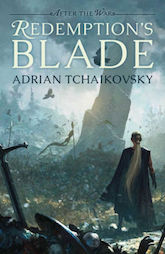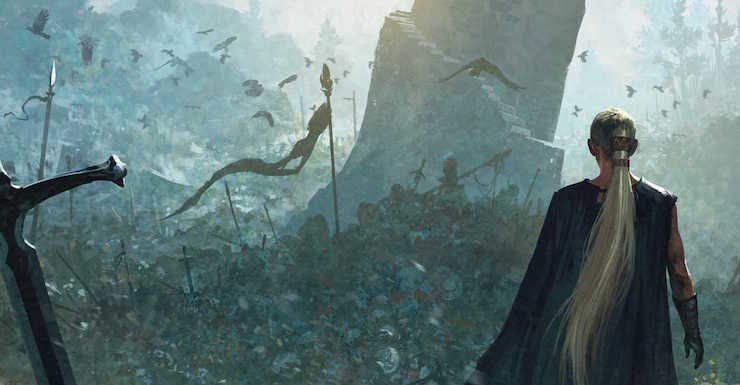A staple of epic fantasy is the interrogation of good versus evil. A “Dark Lord” pursuing their own destructive ends, the civilizations caught in the middle of the war, and the forces of good and light doing their damnedest to push back against the shadow: It’s a tale as old as time, and the constant struggles between good and evil can begin to feel a bit stale and rote as the genre evolves. But with Redemption’s Blade, Adrian Tchaikovsky focuses the narrative not on the battle between good and evil, or on the far flung effects of its occurrence; rather, he starts it about five minutes after the war is over.
Buy the Book


Redemption’s Blade
Celestaine of Forinth is an accomplished warrior and one of the few who managed to kill the Kinslayer, a warped but powerful evil being who had his sights set on the corruption of the known world, torture of those in it, and ruling over whatever remained at the end of his destructive vision. And while many of her fellow warriors have left the band of freedom fighters they made up, Celest isn’t one to rest on her laurels. One of the races bent by the Kinslayer’s vicious campaign, the Aethani, lost their wings. The once sky-high race has fallen on dark times without the wings that were ripped from their bodies. With the help of two turncoat Yorughan (a monstrous race employed and tortured by the Kinslayer), Celest promises Amkulyah, a prince of the Aethani, she’ll do all she can to find a way to bring back the wings of his people. For while the Kinslayer was monstrous, some of the items he wielded had great power, and could work the unthinkable, for good or ill. What follows is a look at what happens when the threat that unites a world is gone, and humanity discovers its capacity for greed, feuding, and fighting again. But there may still be good to be done, if Celest and her friends can find it.
Tchaikovsky is a talented writer with not only a ten-book epic fantasy series under his belt, but also a wealth of other tales, some duologies, others standalone. His ability to create a fully lived-in world, to balance character with plot, to give the reader action pieces followed by heartbreak, is enormous, and though this is a single novel, it felt like several books stitched together. Expertly crafted and bursting with detail, the world of abandoned gods and horrific monsters could easily take up another thousand pages. But it’s all perfectly balanced, as taut as a bowstring. Tchaikovsky only gives you just enough detail, and then he’s off, running to the next thing. It makes the world feel large, even if the story is only focused on this handful of individuals.
And what individuals they are. Redemption’s Blade simultaneously interrogates the tropes used to distinguish “monsters,” races, villains, and horrors from other worlds, and in many cases, elevates these characters to levels of pathos, insight, and complexity, while also never shying away from the darker aspects of humanity. He questions the motivations of heroes to do right, and forces the reader to see monsters as more than their actions. The Vathesk are enormous crab monsters from another dimension, but cannot eat in ours. The Kinslayer used their hunger to kill many, but without him, they are simply starving, and cannot get home. The Yorughan may look monstrous with their stature and huge tusks, but they were beaten, tortured, and subjugated into service to the Kinslayer. While some revel in that, many just wanted to see the sky, and escape their underground home.
Celest’s Yorughan companions are some of the best characters in the book. Giant Nedlam, who’s only good at fighting, is unquestioning in her friendship of Celest and never once thinks to betray her. And the Yorughan mage, a Heart Taker, Heno, is derisive, sarcastic, and blunt, but at the end of the day, hates being told what to do, and will defend the one who helped free him. This talent of character extends to Tchaikovsky’s heroes as well, as Celest is constantly torn over her own motivations. She’s also mocked for her altruism, as others think she may just be looking for another fight—for what good is a soldier without a war?
Redemption’s Blade expertly weaves a tale of huge action and quiet questioning; Tchaikovsky navigates his way through a twisted and thorny tale of morality, anguish, and post-war trauma, and delivers something both firmly nestled in the genre of epic fantasy and wholly unique. If you’re looking for something that celebrates the genre, while working to interrogate and question how that genre works, look no further than Redemption’s Blade. I can only hope there are more tales to tell in this world to come.
Redemption’s Blade is available from Solaris.
Martin Cahill is a contributor to Tor.com, as well as Book Riot and Strange Horizons. He has fiction forthcoming at Beneath Ceaseless Skies and Fireside Fiction. You can follow his musings on Twitter @McflyCahill90.










